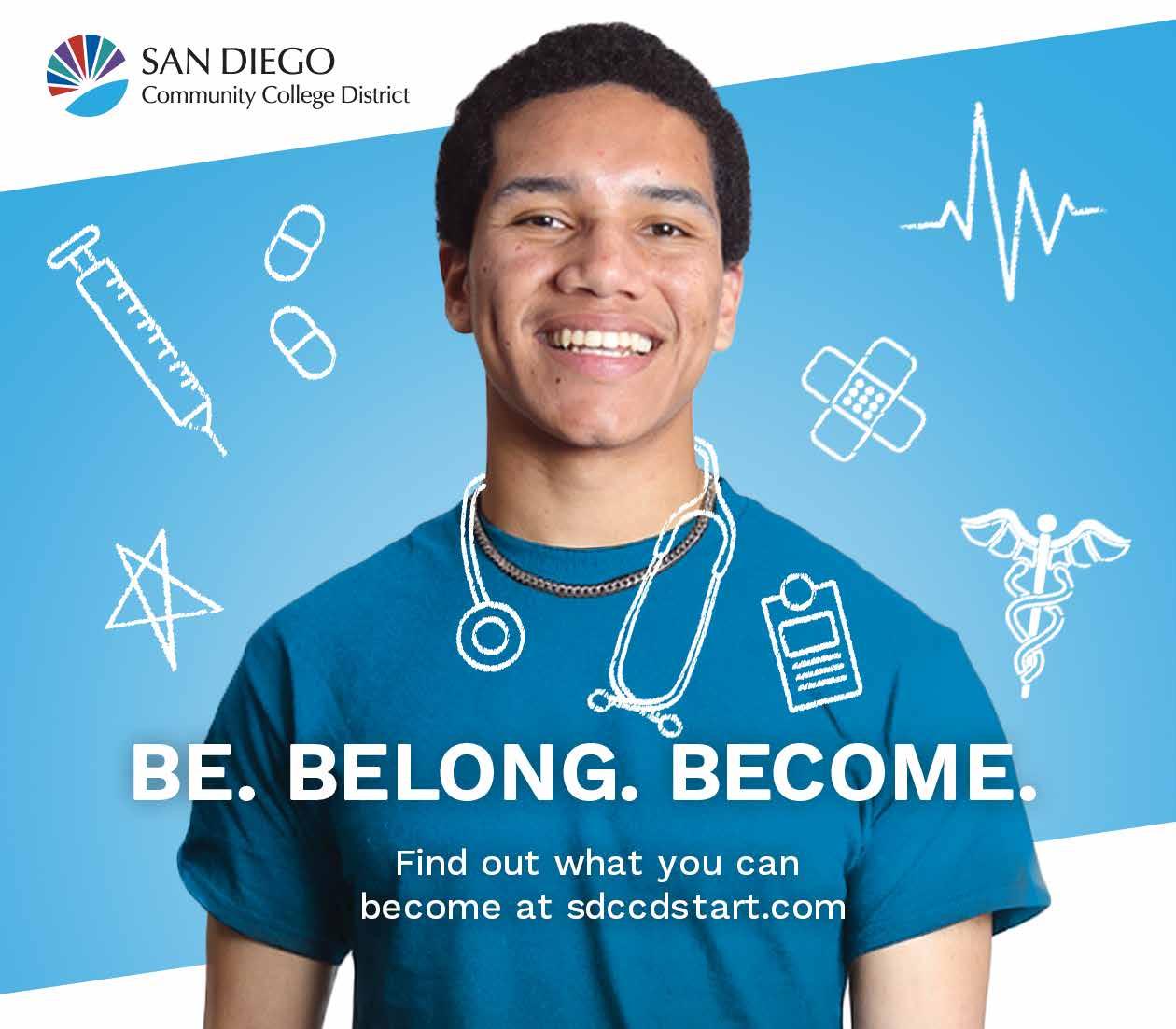




Over the past year, with considerable stakeholder input, we have developed a new logo, tagline, and mission, vision, and values statements for the San Diego Community College District. The updated visual identity and statements reflect the evolution of the San Diego region, our colleges, and our District.
their cultural and individual identities, and achieve their educational goals.
The new mission statement, "We uplift individuals and communities through culturallyresponsive teaching, learning, and work environments," is the District's commitment to our community members.
The mission statement provides a succinct answer to the question – what do we do? At the core of our mission is the individual, the student, engaging with faculty, classified professionals, and administrators across the full scope of teaching and services we provide. Our four colleges and District exist collectively to increase the health, well-being, and prosperity of our communities by providing each individual with an educational environment tailored to their needs and interests.
The new logo uses images of the sun and ocean to connect our colleges and District with San Diego’s natural environment. It incorporates the colors of our colleges and District in a cohesive visual that symbolizes the interconnectedness of our organizations, and conveys themes of radiance, life, growth, renewal, energy, illumination, and power. These thematic elements frame our educational mission and reflect the transformational impact of higher education on individuals and communities. Community members, our students, come with brilliance, power, and energy, which we invest in to expand knowledge, achieve personal and professional growth, and advance the health and well-being of our communities. Be. Belong. Become.
The new tagline for our District conveys the individual experience we aspire to provide every member of our community. We create spaces where each individual can show up authentically, celebrate
SDCCD has a long and celebrated history of service to our region’s business communities. Each year, our colleges and District contribute $4.5 billion to the regional economy. As the largest regional workforce training provider, City College, Mesa College, Miramar College, and the College of Continuing Education are essential to San Diego’s small and midsize businesses and to attracting new high-growth industries to our region. Each year we prepare thousands of community members for careers in healthcare, information technology, skilled trades, tourism, and many more industries, and for transfer to fouryear institutions for advanced degrees.
This fall, voters will have the opportunity to help safeguard the future health and vitality of our region by investing in an infrastructure bond. This investment will ensure we continue to adapt to meet the needs of our communities with state-of-the-art career training facilities, modern classrooms incorporating new technologies which are reshaping professional workplaces, and securing the safety and sustainability of our facilities.
The past two years have been an important transition period for the San Diego Community College District. In 2024-2025, we will set the foundation to guide us in the decade ahead.

Chancellor Gregory Smith




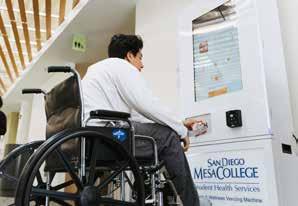
The San Diego Community College District's 2024 graduation season is in the books, and there was much to celebrate. A combined 5,883 graduates received degrees and certificates from San Diego City College, San Diego Mesa College, and San Diego Miramar College this year, an increase of 6% over 2023. Meanwhile, 10,554 vocational program certificates and high school diplomas were awarded to San Diego College of Continuing Education graduates, an 11% increase over 2023.
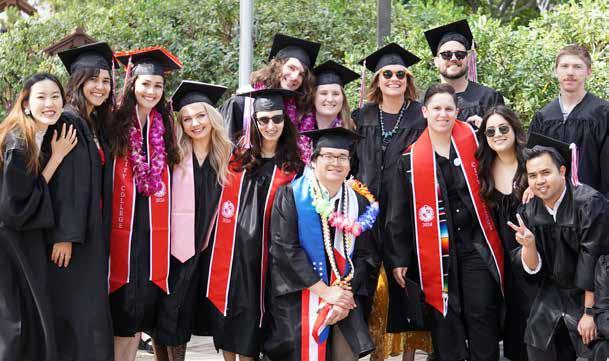

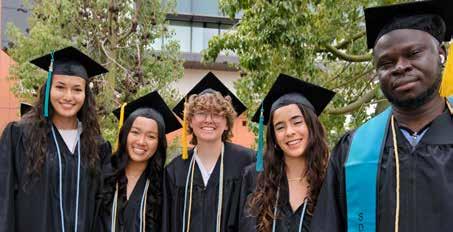

An inaugural cohort of 45 students will start classes this fall in San Diego City College’s new Cyber Defense and Analysis Baccalaureate Program, the first bachelor’s degree program in the college’s 110-year history.
The program was approved in January 2023 by the California Community Colleges Board of Governors, making City College the second campus in the San Diego Community College District to offer a four-year degree. San Diego Mesa College began offering a bachelor’s degree in health information management in 2015, and Miramar College is set to launch a bachelor’s degree in public safety management in fall 2025.
“The bachelor’s degree program in cyber defense and analysis will provide a pipeline that not only leads to an above-livable wage career in an industry that is clearly in demand, but will also help diversify the cyber security workforce by allowing more women, military veterans, and people of color to find good jobs,” said City College President Ricky Shabazz.
In addition to creating new opportunities for students, the program will help fill a critical need in the workforce. More than 1,400 information security analysts are now working in the San Diego region, with employers projected to hire 2,849 additional analysts annually over the next
several years. More than 75% of local cybersecurity companies reported being challenged in finding qualified workers, according to an October 2023 report from the San Diego Regional Economic Development Corporation.
Nationwide, employment of computer security analysts is projected to grow 35% from 2021 to 2031, with demand fueled by the need for innovative solutions in combating an increasing number of cyberattacks, according to the U.S. Bureau of Labor Statistics. The federal agency reported the average annual pay for cybersecurity analysts in the San Diego region was $120,980 in 2023.

For nearly 20 years, the San Diego Community College District has demonstrated a commitment to honor the trust given by voters to efficiently and effectively manage the Propositions S (2002) and N (2006) bond programs, resulting in a history of “clean” audits, high bond ratings, and impressive bond transparency performance
scores awarded by the San Diego County Taxpayers Association. The District completed all bond projects as committed to the voters, plus some additional projects as approved by the SDCCD Board of Trustees. Unfortunately, not all District facilities were covered by these bonds. As such, they have continued to age and require repairs
or a complete replacement. On July 11, the SDCCD Board of Trustees voted to place a measure before the voters in November which would fund $3.5 billion in facilities and infrastructure improvements. As San Diego's leading institution for job training – including for first responders, nurses, emergency medical technicians, and, increasingly, for
careers in biotechnology, cyber defense, and sustainability fields – SDCCD must continue to provide leading-edge academic and career training facilities and technologies required to be responsive to continuously changing industry and workforce needs.
We invite you to learn more about the SDCCD’s 2024 bond at: sdccd.edu/bond2024.
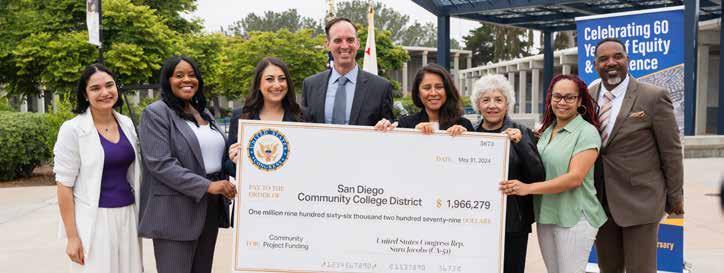
The San Diego Community College District has secured federal funding totaling nearly $2.5 million to finance critical improvements at San Diego Miramar College’s public safety training center, a new student-parent center at Mesa College, and restroom renovations at the College of Continuing Education’s historical Educational Cultural Complex.
Funding was secured through the offices of Congressmembers Sara Jacobs and Juan Vargas.
The largest appropriation, $1,466,279, is earmarked for expanding services at the Mesa College Family Resource Center aimed at supporting student-parents in reaching their educational goals and further contributing to the San Diego economy. The funding will benefit students by allowing the center to extend its hours of operation, add staff, and boost supplies such as diapers and food.
Approximately $500,000 will

be spent renovating Miramar College’s School of Public Safety and its Police Academy. The facility serves as the region’s police officer training facility for the majority of law enforcement agencies in San Diego County. The funding comes on the heels of Miramar College receiving approval to offer a bachelor’s degree in public safety management.
An additional $500,000 will allow for long-overdue upgrades of restrooms at the Educational
As you peruse this issue of With Excellence, you will probably notice something new: a new District logo. The new logo is part of a rebranding aimed at strengthening the District's connection to the community and ensuring more San Diegans are aware of the educational opportunities available at San Diego City College, Mesa College, Miramar College, and the College of Continuing Education.
The new SDCCD logo
Cultural Complex at a time when enrollment has been growing by double-digit percentages for the past two years. Restrooms have not been upgraded since the historical facility opened in 1976. They are no longer ADA compliant and often undergo emergency repairs. Upgrades will reduce water usage by up to 50% through new low-flow toilets and faucets, and touchless features will improve restroom hygiene for students, faculty, and professional staff.
was developed through months of input from students, employees, and community members who expressed interest in seeing a more updated design that strongly aligns the District and college logos and is a better reflection of our mission, vision, and values.
Inspired by the radiant energy of a sunburst, the logo – like our colleges – illuminates our community and celebrates its diversity. It embraces the college colors and
introduces a new cyan blue for the District. With its simplicity and optimistic imagery, this dynamic design reflects the ever-evolving nature of education and the SDCCD’s dedication to fostering a more welcoming learning environment where every individual knows they can succeed.
The official roll out of the new logo and “Be. Belong. Become.” tagline will take place during the 2024-25 academic year.
Elected officials, campus leaders, and honored guests came together June 21 for “Building a Future Together, A Community Celebration to Welcome Chancellor Gregory Smith.” The event, which included an official unveiling of the District's new logo, was a celebration of Chancellor Smith and the District's ongoing commitment to uplift individuals and communities through higher education.


San Diego Community College District Chancellor Gregory Smith recently welcomed two innovative leaders to the District's executive leadership team.

Jared Burns, vice chancellor of People, Culture and Technology Services
Jared Burns is SDCCD’s new vice chancellor of People, Culture and Technology Services, a role previously held by Smith. He joined the District on
June 17 after serving as associate vice president of human resources at Mississippi Gulf Coast Community College, the largest community college district in the state.
At SDCCD, he’ll oversee the District's People, Culture and Technology Services programs, monitor regulations that affect employment and technology at community colleges across California, and ensure timely reporting to government regulators.
“We are excited to welcome Jared to the San Diego community,” said Chancellor Gregory Smith. “His extensive national community college and human resources experience will bring new perspectives
and innovative approaches to advance our mission to uplift our diverse student and employee communities.”
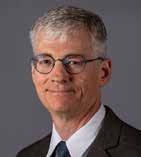
Daniel Troy, vice chancellor of Finance and Business Services
Daniel Troy is SDCCD’s new vice chancellor of Finance and Business Services, stepping into the role on June 28 after holding several leadership positions managing fiscal operations at the state and local levels.
Troy comes to SDCCD from the San Luis Obispo County Community College District's Cuesta College, where he had served as assistant superintendent/vice president of Administrative Services since April 2016. Prior to Cuesta College, Troy was vice chancellor for College Finance and Facilities Planning within the California Community Colleges Chancellor’s Office.
“Dan will be a great addition to our executive leadership group,” Chancellor Smith said. “His deep expertise in community college and state finance will ensure our District continues to be a recognized leader in fiscal policy decisions impacting our students.”

SDCCD colleges are building a healthier community
By Nick Macchione, M.S., M.P.H., F.A.C.H.E.

Population health is about all of us. It is about giving people the accurate and timely information they need to make knowledgeable decisions for their own well-being. It’s about training a whole array of health professionals, such as nurses, medical lab technicians, behavioral health professionals, and other healthcare workers who reflect the
rich diversity of our region. And it’s about engaging the community and providing holistic resources that help people live well and thrive. In all those ways and more, San Diego Community College District plays a key role as the heartbeat of healthcare workforce development in San Diego. The District supports the well-being of all San Diegans, including through low-cost or nocost career-training programs that equip the next generation of health and wellness professionals needed to keep our diverse, cross-border
community thriving. That work has never been more important:
• A study by the University of St. Augustine for Health Sciences estimates California could be short 44,000 nurses by 2030.
• The California Hospital Association estimates that to meet projected demands, California needs to add 500,000 new allied healthcare professionals such as medical assistants, imaging specialists, and more.
• A new study from the San Diego-Imperial Counties Centers

of Excellence for Labor Market Research warns of the workforce crisis facing the region’s senior care industry, including the need for more certified nursing assistants and other allied professionals as our population ages.
• And a November 2022 report by the San Diego Workforce Partnership illustrates our region’s severe shortage of behavioral health professionals, with an estimated 17,000 employed in 11 key occupations — 8,000 short of the 25,000 workers needed.
SDCCD colleges are a linchpin in preparing students in our community to step into many of these vital jobs, while also offering affordable education pathways to healthcare careers that require advanced degrees. The District's career-training programs range from nursing, physical therapy and medical technicians, to nutrition, to mental health counseling, and health information management. The professionals they train include many first-generation college students, people of color, English language learners and others from underserved communities.
In my 15 years leading the County of San Diego Health and Human Services Agency — the largest public health employer in the region — some of my best frontline managers came with associate degrees from San Diego community colleges. The same theme emerged in speaking with CEOs of other large local healthcare systems — employees that come from community colleges bring a deep sense of purpose, passion, and skill to their work.
Just as important as feeding the healthcare workforce, SDCCD’s colleges make a significant impact on the overall health of our community by supporting residents, including underserved communities, with no-cost or low-cost programs and services that have tremendous health benefits. Those programs and services include on-campus clinics, health and fitness classes like yoga and nutrition, mental health counseling, and more.
According to a 2023 economic impact report, the District's four colleges — San Diego City College, Mesa College, Miramar College, and the College of Continuing Education — contribute $4.5 billion to our region’s economy, which for the people who live here means more access to jobs, food, housing, and healthcare –building blocks for a better quality of life.
San Diego’s healthcare industry is committed to prioritizing community engagement and promoting social justice by addressing social determinants of health and advocating for policies that support health equity. San Diego Community College District is a leader in our city and county, and an incredibly valued partner in that pursuit.
Nick Macchione, M.S., M.P.H., F.A.C.H.E., is Chief Health Officer at UC San Diego Health and the former director of the County of San Diego Health and Human Services Agency. He has more than 35 years of clinical and executive experience leading and managing large, complex service health and human service delivery systems with a mission to help all people live well and thrive.
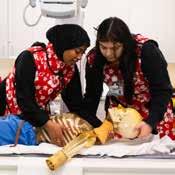
SDCCD programs are building a stronger, more diverse workforce

District's four colleges offer health-and-fitness programs that lead to vital careers, healthier communities

SDCCD provides crucial health and wellness services to help students thrive
SDCCD programs are building a stronger, more diverse healthcare workforce in San Diego
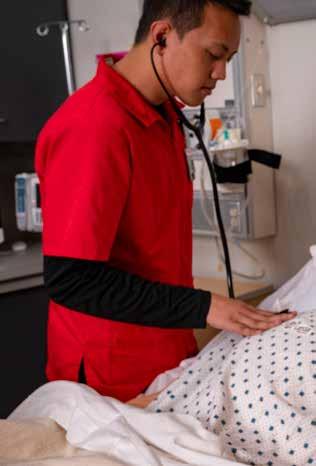
San Diego Community College District's healthcare degree and certificate programs do more than provide students with affordable career training in one of the region's fastest-growing industries. As a primary driver of San Diego’s healthcare workforce, the District is helping to improve access to care for all San Diegans while ensuring the region’s healthcare professionals better reflect the communities they serve.
Healthcare is San Diego’s second biggest employer, with more than 15,500 jobs added in the private education and health services sector over the past year, state data shows. Nationally, about 1.8 million job openings in healthcare are projected each year to fill new or vacant positions, according to the U.S. Bureau of Labor Statistics.
Yet the healthcare workforce is still predominantly white (53.9%), according to the National Institutes of Health (NIH) Workforce Demographics. In California, Hispanic and Latinx nurses accounted for only 9.6% of California’s active nurses in 2020, and Black/ African American nurses represented 4.7%, according to the "California Board of Registered Nursing 2020 Survey of Registered Nurses."
The District's four colleges — San Diego City College, San Diego Mesa College, San Diego Miramar College, and the San Diego College of Continuing Education — are working to change all that.
“From the instructors to the students, we want to change the look of the healthcare industry,” said Cassandra Storey, dean of Health Sciences and Public Service at Mesa College. “The quality and diversity of District graduates align with the goals of the region’s leading healthcare providers.”
Helping students transition seamlessly into the workforce is another goal. Students enrolled in many of the District's healthcare training programs are required to fulfill clinical hours at Directed Clinical Practice (DCP) health facilities throughout the San Diego region, which can lead to permanent employment.
“Through DCP, students get real-world experience in the field,” said Connie Renda, professor and health education program director at Mesa College. “Once they complete their 135 hours, if a job opens at that health care facility, the employer often hires the student because they have essentially had a three-month long interview and know their work ethic.”
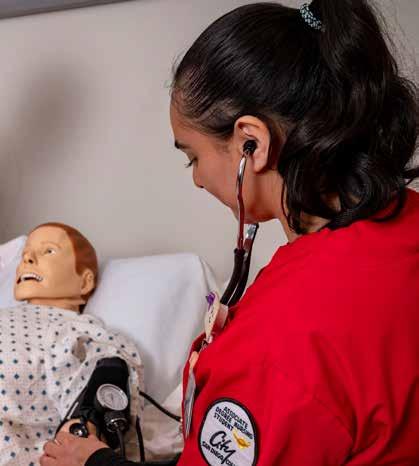
With one of the top nursing schools in the state, City College is helping to address a nursing shortage that grew to near-crisis levels across the country during the COVID-19 pandemic. The college’s associate of science degree in nursing offers students a pathway from licensed vocational nurse to registered nurse, with admission by special application.
City College’s nursing program has achieved significant recognition. It was recently ranked the second-best nursing school in California for the second consecutive year by RegisteredNursing.org, a leading resource for the nursing industry. In 2023, the college was ranked the third-best nursing program in the nation and named the second-best nursing program in the state, according to RNCareers.org.
Upon successfully completing City College’s RN program, graduates are eligible to take the National Council Licensure Examination for Registered Nurses (NCLEX-RN) to begin practicing. In 2022-23, City College graduates had an impressive 100% pass rate.
“This achievement is a testament to the tireless efforts of our nursing faculty members and classified professionals in preparing students for the challenges of the healthcare field, ensuring they emerge as compassionate
The San Diego Community College District is committed to streamlining pathways from program completion into healthcare careers, including through a new program that quickly reimburses students for all licensing, certification, and testing fees that need to be completed before they can begin practicing in their field.
The fees are covered through private donors, foundations, and some public funds. Depending on the chosen field, fees can range from $250 to more than $1,200 — a significant burden to students ready to enter the healthcare workforce. Many students have already taken time away from work in order to complete rigorous programs, including some that have residency requirements.
Nearly 1,000 students are expected to benefit from the fee-reimbursement program in 2024-25 across the District's four colleges, with about $384,000 in fees covered for students graduating from the following healthcare programs:
• City College – Registered Nurse
• Miramar College – Emergency Medical Technician, Medical Laboratory Technician
• Mesa College – Physical Therapy Assistant, Medical Assistant, Neurodiagnostic Technician, Phlebotomy, Radiology Technician, Health Information Management Systems, Health Education Information Technology, Dental Assistant, Veterinary Technician
• College of Continuing Education – Certified Nursing Assistant
Aliana Soriano, a recent graduate of San Diego City College’s registered nursing program, said knowing the fees would be covered allowed her to focus on studying to pass the licensure exam and finalizing her application.
“The financial help (the District) is providing recent graduates like me helps tremendously,” she said in a letter. “It lessens the stress of finding enough funds to support myself with food and transportation while applying for the exams. Words cannot express my gratitude.”
If you would like to support this program, please contact Laurie Coskey, vice chancellor of Development and Entrepreneurship, at lcoskey@sdccd.edu.
advocates for patient well-being,” said Dometrives Armstrong, associate dean of Nursing Education at City College and a key leader in the college's efforts to build a more diverse healthcare workforce.
Of the 122 students in the nursing program in fall 2024, 38% are Hispanic/Latinx, 20% are multiracial, 19% are white, and 14% are Asian.
Ashley Watson, who graduated from City College in fall 2023 with her associate degree in registered nursing, said the diversity in the nursing program is important to students like her who want to see change in the industry.
“I’m interested in making sure that my own culture has proper representation within the healthcare setting,” Watson said. “I want to be an advocate for minorities in general, to make sure that we have proper healthcare.”
City College’s nursing program is accredited by the California Board of Registered Nursing and the Accreditation Commission for Education in Nursing (ACEN). The college was the first community college in California to have a joint accreditation review with the two agencies in fall 2021, creating a roadmap for other California community colleges.
Mesa College is an innovator in healthcare education as the first California community college to offer a Bachelor of Science Degree in Health Information Management (HIM).
The number of people working in health information management nationwide is projected to grow 16% from 2022 to 2032, much faster than the average for all occupations, according to the most recent figures from the U.S. Bureau of Labor Statistics. The median annual wage for health information technologists and medical registrars was $62,990 in May 2023.
Mesa College launched its HIM bachelor’s degree in 2015, building on a two-year degree in health information technology that has been offered since 1963. The first bachelor’s degrees at Mesa College were awarded in 2018; so far more than 150 students have graduated from the HIM bachelor’s degree program.
“Employers were begging for a program like this to train skilled workers,” said Renda, who authored the college’s HIM baccalaureate curriculum. “The best part is the HIM baccalaureate degree is accessible and affordable. It is only $10,500 for a full four-year degree from an accredited college. Students can also apply for

financial aid, scholarships, and exam waivers.”
The degree provided Mesa College alumnus Thu Lam with a rewarding career path.
“I believe that when you have enough knowledge, you can work anywhere,” said Lam, who is now a health information management technician at the County of San Diego Department of Health, Epidemiology Unit. “Mesa College helped me to have more knowledge and hands-on experience, so that when I got out of the school, I would get a job easier.”
In October 2023, Mesa College was granted provisional approval by the California Community Colleges Chancellor’s Office to offer a bachelor's degree in its physical therapist assistant program. Mesa College already offers an associate of science degree in physical therapy; a bachelor’s degree will give students the ability to enhance their clinical and leadership skills.
“We know that access to affordable and quality education is essential for closing equity gaps, social mobility, and empowering individuals to live their lives of purpose and service," said Mesa College President Ashanti T. Hands. "Offering this baccalaureate ... will not only enhance access for our students but also attract diverse employees to enter the field, address the need for
more health professionals, and ensure a workforce that reflects the diversity of our community."
Mesa College also offers the most affordable radiologic technology associate degree in the state, as well as other healthcare degree and certificate programs including dental assisting, dental office administration, medical assisting, neurodiagnostic technology, health information technology, health information management, veterinary technology, physical therapy assistant and phlebotomy.
At Miramar College, students are becoming skilled medical lab technicians through the college’s Medical Laboratory Technology Training degree and certificate program. Coursework emphasizes mathematical and scientific concepts to ensure the essential assessment of the health of patients as well as the underlying diagnosis and treatment of diseases.
“Our students are well primed to work in any biotechnological field. They have the foundational knowledge and skill set,” said Milton Lewis, program director.
Due to the rapid demand for skilled medical lab technicians in San Diego, Miramar College students are
getting hired before they graduate. Medical lab technicians in the San Diego area earn between $51,491 and $72,381, according to salary.com.
The Miramar College program is approved by the California Department of Public Health Laboratory Field Services and allows recent graduates to become licensed in the state and nation.
Meanwhile, the college’s Emergency Medical Technician program is building diversity in the workforce through a partnership with American Medical Response (AMR) that’s helping more female cadets become Emergency Medical Technicians (EMT) and paramedics.
“Emergency medical services is historically a male-dominated field,” said Mary Kjartanson, Miramar College’s EMT program director. “Miramar College provides an environment that supports equity and diversity across programs and disciplines. (We are) fortunate to partner with AMR in supporting women in breaching barriers to emergency response pathways.”
To support students facing financial barriers, AMR covers the cost for tuition and books and pays students for the hours they attend class and ride-alongs. Cadets shadow AMR EMTs and paramedics as they respond to actual emergencies across San Diego County. Upon
Growing up in Mexico, Vanessa Munguia always dreamed of being a nurse. “Ever since I could remember I enjoyed helping people,” she said. “I am a passionate, empathetic, and patient person.”
Munguia followed her dream to Universidad de Guadalajara, where she earned her bachelor’s degree in nursing. She worked for three years as a board-certified registered nurse in Guadalajara and Tizapán, before challenges in the industry — including a lack of personal protective equipment in Mexico during the COVID-19 pandemic — spurred her to move to San Diego.
A new country meant a new start. Munguia said her first goal was learning the language, so she enrolled in San Diego College of Continuing Education and began taking English as a Second Language classes in fall 2022. She also enrolled in the college’s tuition-free Certified Nursing Assistant Program, completing it in May 2024.
“I learned the phrase ‘don't give up’ here,” she said about the College of Continuing Education. “I remember my first day of class, when I thought I couldn’t do this, my professor told me, ‘don’t quit, keep going — even if you have obstacles, carry on and
never give up.’”
Munguia is now enrolled in advanced ESL classes at SDCCE and has passed the state exam to be a certified CNA. She is still eligible to validate the RN degree she earned in Mexico, but said she wanted to get nursing experience in this country first and is grateful she found the College of Continuing Education.
“I want to be the best nurse I can be,” Munguia said. “I’m glad I started with the nursing assistant courses here, to get used to how nurses work in the U.S.” She said she hopes to eventually become a pediatric nurse.

completion of the academy and passing a national EMT exam, cadets are hired by AMR and are eligible for medical, dental, vision, and 401(k) benefits.
A cost-free Pre-Apprenticeship EMT Academy is also being offered through the College of Continuing Education in partnership with the California Firefighter Joint Apprenticeship Committee (Cal-JAC).
Miramar College also offers an associate of science degree in biology/allied health that prepares students and satisfies prerequisites for those entering nursing programs or allied health professions such as physical therapist, dental hygienist, medical technician, physician’s assistant, and optometrist.
The College of Continuing Education offers seven tuition-free healthcare career certificates: Nursing Assistant, Rehabilitative Nursing Assistant, Acute Care Nursing Assistant, Personal Care Assistant/Caregiver, Home Health Aide, Behavioral Home Health Aide, and Health Unit Coordinator.
The programs, which include support for English language learners, “honor the college’s commitment to serve our community, celebrate diversity and to create an enriched workforce,” said Catherine Shafer, acting dean of Healthcare Careers and Community Education.
The tuition-free 16-week CNA program prepares students for the state CNA examination (CCE students have a 98% pass rate), and provides opportunities for clinical rotations at local hospitals and healthcare facilities. Graduates who pass the exam become certified as a nursing assistant by the state of California and can work in rehabilitation and longterm care facilities.
CNA Eric Burke said he was able to get a job quickly after completing the program.
“All hospitals require experience ... and more often than not you are competing for only three open CNA positions,” Burke said. “I put six months of clinical experience from the College of Continuing Education on my resume and Sharp accepted that.”
In 2023, the College of Continuing Education launched a new dual enrollment partnership with the San Diego Unified School District, permitting high school students to train as CNAs at the college’s César E. Chávez Campus. By the time they graduate high school, these students are eligible to become state-certified CNAs and can enter the workforce early or use credits toward a healthcare degree.

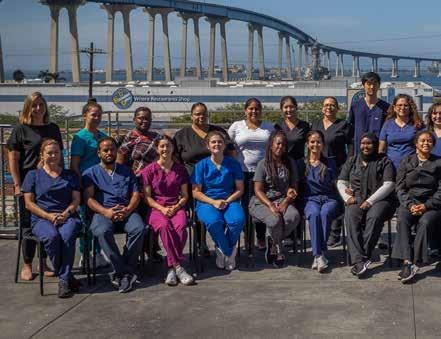
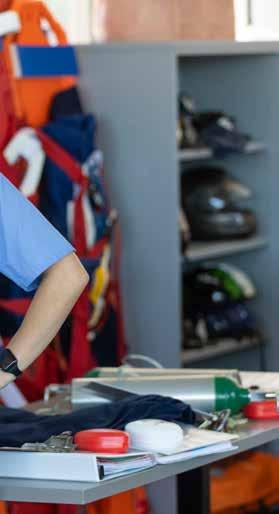

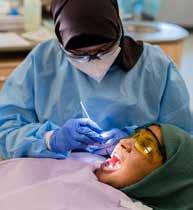
San Diego Mesa College’s Health and Wellness Community Clinic provides pro bono physical therapy rehabilitation and dental services, helping uninsured or underinsured communities access services they might otherwise be unable to afford.
In 2023, Mesa College served 414 patients through the clinic. Students in the college’s Dental Assisting program and Physical Therapy Assistant program help care for patients, working alongside an instructor already licensed in the field.
“Not only are we serving the community, but the opportunity allows our students to become better employees,” said Connie Renda, professor and health education program director at Mesa College.
Amanda Johnston, director of Mesa College’s Physical Therapist Assistant program, said students recognize how valuable that hands-on experience is to their educational training.
“(It) helps them understand different diagnoses that patients may have that cannot be fully understood by written description or video,” Johnston said.
Karen Wait, director of Mesa College’s Dental Assisting program, said the response has been very positive in the dental portion of the clinic, where community residents can get needed dental services such as exams and X-rays at no cost.
“We have students and people from the community being seen for multiple procedures,” she said. “We even had people return from last year to have services completed.”
Patricia Santos, who graduated from Mesa College’s Physical Therapy Assistant program in May 2024, said working in the clinic was a vital part of her training.
Miramar College’s Emergency Medical Technician program (top) is partnering with American Medical Response (AMR) to help more female cadets become EMTs and paramedics. The College of Continuing Education’s 2024 class of Certified Nursing Assistants.
“Participating in the Mesa Community Clinic has been instrumental in preparing me for my career as a PTA. It has provided me with valuable insights into patient interactions, treatment protocols, and collaborative healthcare practices,” Santos said. “These experiences are shaping me into a well-rounded healthcare professional, ready to make meaningful contributions to the field of physical therapy.”
Both Wait and Johnston hope the clinic will grow to include additional services and learning opportunities.
“I would love to expand the clinic to offer more services,” Wait said. “The need for dental services is great for people who are underinsured or have no insurance at all, and adding more services would allow students to practice more skill sets prior to graduation. It really is a ‘win-win’ for both the student and the community.”
San Diego is consistently ranked as one of the healthiest cities in the nation and the San Diego Community College District is committed to helping it stay that way.
In addition to training students for traditional healthcare careers, the District's four colleges — San Diego City College, Mesa College, Miramar College, and the College of Continuing Education — offer degrees and certificate programs in fields like nutrition, personal training, wellness coaching, and kinesiology that are pathways to health-and-wellness careers or four-year degrees in related sciences.
Those fields support the region’s sports and active lifestyle industry, a diverse collection of businesses that cater to people who participate in sports, active lifestyle and leisure activities in San Diego. A 2018 report by the California State University, San Marcos Office of Business Research and Consulting and San Diego Sports Innovators found such businesses had a direct economic impact of $3.6 billion and created more than 67,000 jobs.
For San Diegans pursuing a healthier lifestyle, SDCCD colleges also offer a variety of affordable sports, health, and fitness classes. Engaging in regular exercise can combat obesity, an epidemic affecting nearly 40% of adults in the U.S. and costing the healthcare system $173 billion a year, according to the U.S. Centers for Disease Control and Prevention. Sometimes, a passion for personal fitness can lead to a new career.
For instance, Miramar College offers yoga courses that equip students to become registered yoga teachers with Yoga Alliance. The 16-week program comprises three classes: the history and philosophy of yoga, anatomy and physiology, and practical experience for students.
Empowering students to make healthier choices has lifelong benefits, whatever path they pursue.
“There are many things related to our health that we have no control over,” said Mardi Parelman, an associate professor in the exercise and nutritional sciences program at Miramar
College. “But what we eat and how we enjoy what we eat and the amount of exercise we get are modifiable factors that we do have input in. Those are the things that we can be aware of and make changes if we want.”
Here are just a few of the health-and-wellness programs SDCCD colleges offer:
City, Mesa, and Miramar colleges all offer associate degrees in kinesiology, the study of human movement. A kinesiology degree can lead to a wide number of career paths, including as a physical therapist, strength coach, personal trainer, occupational therapist, physical education teacher, or physiologist. Many physicians, nurses, and other health practitioners also start their educational journey with a degree in kinesiology.
“I don’t think many people know how many doors a degree in kinesiology opens,” said Andrea Milburn, chair of City College’s Health, Exercise Science, Nutrition, and Athletics Department.
Students who earn an Associate in Arts for Transfer Degree in Kinesiology can transition to a university to earn a bachelor’s degree, the minimum requirement for most kinesiology careers. According to the U.S. Bureau of Labor Statistics, the median annual pay for exercise physiologists (an umbrella term that includes kinesiologists) was $54,860 in 2023. Meanwhile, the


impact of a kinesiologist’s work can be immeasurable, Milburn said. Many of the students in City College’s program played sports, so they understand the importance of how the human body moves.
“Maybe they had a coach that was really impactful, or they are just naturally drawn to helping others,” she said. “It literally changes people’s lives to make sure they are getting enough exercise.”
City College also offers a variety of health education, exercise science, athletics, and nutrition courses for students who want to improve their own health or explore fitness-related careers.
Health and wellness coaches work with clients to help them take healthy steps such as better eating, stress management and exercise. Mesa College is one of the first community colleges in the country, and the first in California, to offer a Health and Wellness Coaching Certificate approved by the National Board for Health and Wellness Coaching.
“So much of healthcare focuses on a treatment model,” said Kelsey Graham, an associate professor of exercise science at Mesa College and director of the college’s health and wellness coaching program. “Health coaching is a prevention model. We look at preventative care rather than a treatment paradigm. It really is better for the patient.”
Mesa College’s wellness coaching program, including a 19-unit online certificate of achievement and 10-unit certificate of performance, can be completed in a year. Graduates can then apply to become a national board-certified health and wellness coach.
Graham said many students in the program already work in a health-related field and want to do more to help their clients.
“A lot of them feel limited in what they can do,” she said. “They want to focus more on their clients’ physical and mental well-being.”

After graduating from culinary school at Johnson & Wales University in Denver, Tiffany Kor moved to New York City to explore the city’s vibrant restaurant scene. She landed a job at an Mediterranean Italian eatery that was a cafe by day and fine-dining restaurant by night. Less than a year later, however, the restaurant and thousands of others across the country shut down due to the COVID-19 pandemic and Kor lost her job.
Ready for a career change, she returned to San Diego and enrolled in the Exercise and Nutritional Sciences program at San Diego Miramar College, with the goal of becoming a registered dietitian.
Kor graduated from Miramar in 2023, and is now attending San Diego State University, working toward her bachelor’s degree in food and nutrition. She was recently elected vice president of SDSU’s Student Nutrition Organization, which aims to serve the San Diego community through nutrition education, advocacy, and philanthropic activities.
A Mira Mesa resident, Kor said Miramar College gave her the chance to start a second career.
“I really enjoyed it,” she said about Miramar’s program. “It was like an introduction to nutrition and the careers I can go into. I’m glad I took that route.”
In addition to becoming a dietitian, Kor is exploring careers in food science that would allow her to develop new and healthier products.
“I really like the more holistic route of nutrition,” Kor said. “I enjoy the fact that I can educate and teach other people about healthier eating habits as well as ways to heal through food.”
For students who want to be in dietetics, it's great to get that experience early in your education, in a safe and nurturing environment.
― Mardi Parelman
Associate
For students who want to become a registered dietitian, Miramar and Mesa colleges offer an Associate of Science for Transfer Degree in Nutrition and Dietetics that is a great first step toward that career path. (To be a registered dietitian requires a master’s degree.)
Parelman, the associate professor of nutritional sciences at Miramar College, said at community colleges, students can get a true taste for the field, with more hands-on experience than at a large university.
“For students who want to be in dietetics, it’s great to get that experience early in your education in a safe and nurturing environment,” she said. “Then you’ll have more opportunities in the world to succeed.”
Recognizing that dietetics is a science, Miramar College’s program includes courses in microbiology, general biology, anatomy and physiology, Parelman said.
Miramar College also offers Nutrition 150, a popular course for people looking to improve their own diet. Parelman said the course teaches students how to distinguish between healthy eating and fad diets.
“Helping people find their way to enjoy food and have a pleasant relationship with food and eating is a goal I have in my classes,” she said.
Miramar and Mesa colleges both offer a Personal Training Certificate program that gives students the hands-on training and tools to become a personal trainer, group fitness instructor, or other fitness professional. Students learn an individualized approach to assess, educate, motivate, and train clients in a variety of settings.
The programs comprise 19-23 units of experiential learning, with faculty that include entrepreneurs, strength and conditioning specialists, personal trainers, exercise physiologists, athletic trainers, and nutritionists.
For seniors looking to stay intellectually stimulated and improve their fitness, San Diego College of Continuing Education offers free noncredit classes through its Emeritus Program.

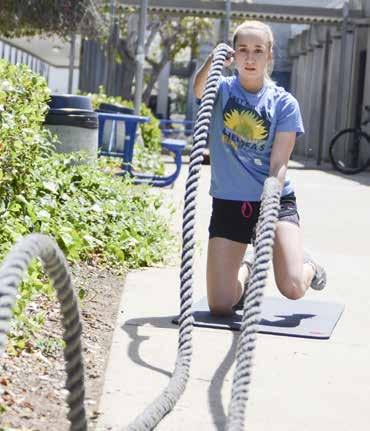
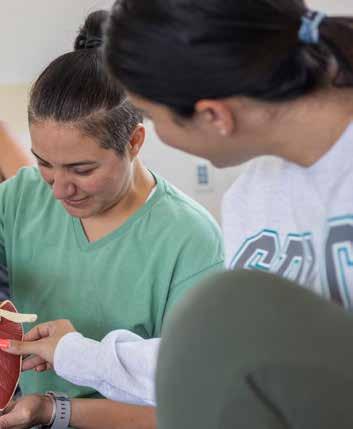
Charlene Schade, an instructor and assistant program chair for the Emeritus program, said the classes for adults 55 years old and older are designed to promote positive aging.
“Emeritus courses take a holistic approach to physical and mental well-being and focus on supporting healthy choices, improved brain health, and personal growth,” she said.
The program offers four classes focused on health and wellness that are offered in person, online and a hybrid version:
• Nutrition Health: offers practical tips to help older adults meet their nutritional needs and manage or reduce the risk of diet-related chronic conditions.
• Brain Fitness: helps students to enhance their cognitive vitality and overall brain health. The course offers an exploration of lifestyle choices that promote brain health and strategies to manage health to reduce the risk of age-related cognitive decline.
• Health Education for Older Adults: this class provides health information and activities to help students keep moving, stay safe, and maintain mental and physical health.
• Body Dynamics Aging Process: this class emphasizes the components of physical fitness, as well as deep breathing, circulation, flexibility, balance, stamina, and body awareness.
Schade, who is 89, is a living example of the importance of older adults staying active and involved. She said her students have responded positively to the classes.
“At the end of every semester, I ask them if they’ve maintained or improved their lives, and they all say yes,” she said. “You’re never too old to learn.”

San Diego Mesa College alumnus Vasantha Eswara has turned her personal battle with breast cancer into a mission to support and empower other women as a National Board Certified Health and Wellness Coach (NBC-HWC).
Eswara achieved her certification after completing Mesa College's Health and Wellness Certificate program in 2023. At the time, she was already a pharmacist with a master’s of science degree from Temple University in Philadelphia, along with a master’s in business administration from California State University, Sacramento.
Her journey to wellness coaching began 20 years ago, after she was diagnosed with breast cancer. Eswara underwent chemotherapy, radiation and multiple surgeries while raising her 4-year-old daughter. She said the challenging and life-changing experience fueled her desire to support other women facing similar ordeals.
Though she had always loved helping others, it wasn’t until a friend suggested she get certified as a health and wellness coach that Eswara considered turning that passion into something more.
After extensive research, she discovered the program at Mesa College, which is approved by the National Board for Health and Wellness Coaching. The one-year program — with tuition for California residents costing approximately $746 — offered the best value with its excellent faculty and fully online format, Eswara
said. This mix of live and asynchronous classes made it easy for her to participate, despite living in the Sacramento area.
Eswara said the Mesa College faculty, especially professor Jennifer Davenport, provided practical advice and support to help jump-start students’ success, even after the program ended. Program director Kelsey Graham was also deeply invested in supporting students, Eswara said, including expanding the program to meet the needs of a diverse student population.
Mesa College now offers two Health and Wellness Coaching tracks: a 19-unit certificate of achievement program and a 10unit certificate of performance. The certificate of performance, which is launching in fall 2024, is for people already working within health- or wellness-related fields or who have a bachelor’s or master’s degree in a similar field.
After completing the certificate of achievement program and earning her NBC-HWC certification, Eswara founded Sierra Cancer Wellness LLC., a health-and-wellness coaching service that offers personalized coaching and group workshops to provide holistic support to women affected by breast cancer.
She is now working with cancer centers in the greater Sacramento area to support patients and survivors, and was recently appointed to the board of directors at Snowline Health.

SDCCD provides crucial health and wellness services to help students thrive

TheSan Diego Community College District takes a holistic approach to student well-being, with programs that support physical, emotional, and mental health — helping students to succeed in higher education and beyond. Research shows that increased health and wellness can lead to higher retention rates and better academic performance.
Across its four colleges, SDCCD offers students access to a variety of services and wellness activities with a goal to provide equitable and inclusive care and services, while eliminating barriers that might prevent students from seeking help.
“Together, we can build a thriving community where we know how to find help when we need it,” said Poppy Fitch, dean of Wellness and Disability Support Programs and Services. “My vision is that at SDCCD, we commit to being well, together.”
Students who are enrolled in at least one class at one of the three credit colleges have access to health services that are either free
or significantly reduced in costs, so that all students can get the care they need.
“We strive for continuous quality improvement, equitable access to services, culturally relevant programs, and significant contributions to student success,” said Suzanne Khambata, director of Student Health Services at San Diego Mesa College. “We do this with comfort, care, concern, and research-based evidence to support our practice.”
Healthcare services offered by SDCCD include diagnosis and treatment of illnesses; free visits with a registered nurse, medical doctor, or nurse practitioner; weight, blood pressure, vision, diabetes, cholesterol, and tuberculosis screenings; lab tests; preventative care; and more. Those services have saved lives, Khambata said.
District colleges are also finding innovative ways to provide care. Mesa College recently received a California Community College Chancellor's Office grant to purchase, stock, and install a wellness vending machine. The self-serve machine carries free and low-cost
everyday needs such as contraceptive devices and medication, menstrual products, over-the-counter pain relievers, and pregnancy tests.
But supporting the whole student is more than just providing healthcare. All District colleges have programs and events to help students connect with each other and access basic services such as food, housing, transportation, and more.
Supporting students’ mental health is a key focus for SDCCD leaders, said Fitch, the wellness disability support dean. Citing a 2023 study by The Healthy Minds Network, she said mental health worsened for all students at colleges nationwide following the COVID-19 pandemic, with students who are Black, indigenous and/or people of color particularly vulnerable.
A collaboration of SDCCD mental health leaders has developed a comprehensive districtwide strategy aimed at bolstering mental health awareness and prevention activities and fostering increased access to mental health services and supports. The effort is being funded by a Conrad Prebys Foundation Youth Mental Health Grant.
Understanding the importance of identity, basic needs such as food and housing, and mental health is crucial to meeting the needs of each student, Fitch said.
At San Diego City College, mental health coordinator Leslie Easton leads robust mental health services in which mental health counselors are embedded into programs like Puente Project, Umoja Community, and Hermanos Unidos Brothers United (HUBU) to ensure the intersection of identity and mental health is prioritized.
Julia Kamp, a mental health counselor at Miramar College, has seen what an impact mental health services can have on students who are struggling, including veterans overcoming post-traumatic stress disorder and students coping with social anxiety.
“Building a sense of community, belonging, and equitable support for students to navigate their stressors and maintain their physical health can keep them on the pathway to academic and career success, acting as a bridge on their journey to effectively meet their life goals,” Kamp said.
In addition to counseling with a mental health professional, students at all District campuses have free access to support groups, educational workshops, wellness fairs, and Headspace, a mindfulness and meditation app.
On May 16, San Diego College of Continuing Education hosted its Inaugural Mental Health Fair, with 16 community partners and more than 200 students attending, said Janisha Street, the college’s mental health coordinator. Students were able to access important resources, flu and COVID-19 vaccines, a meditation 101 lesson, and giveaways — all geared toward supporting mental health.
The wide range of mental health services, programs, and events at District colleges play a crucial role in keeping students healthy, Fitch said.
“It's important we prioritize mental health with the same urgency and attention we give to physical health,” she said. “Districtwide, our shared goal is to foster an environment where mental well-being is a foundation of community health.”
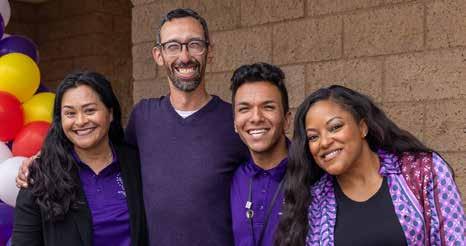
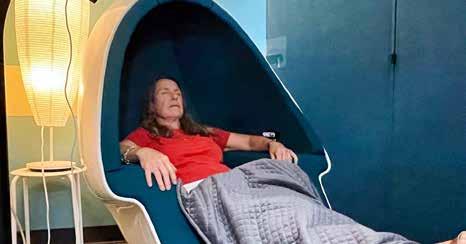
CITY COLLEGE
Student health: (619) 388-3450
Mental health services: (619) 388-3055; citymhcc@sdccd.edu
Basic needs: citybasicneeds@sdccd.edu; (619) 388-3684
MESA COLLEGE
Student health and mental health services: (619) 388-2774
Basic needs: mesathestand@sdccd.edu; (619) 388-5726
MIRAMAR COLLEGE
Student health and mental health services: (619) 388-7881
Basic needs: cmorgan@sdccd.edu; (619) 388-7154
COLLEGE OF CONTINUING EDUCATION
Student health and mental health services: (619) 388-SDCE (7323) Basic needs: sdccebasicneeds@sdccd.edu


Talk about being on the cutting edge of student services outreach. San Diego City College is breaking the mold with Fresh Cutz, a recently opened on-campus barbershop that provides free haircuts – with a catch. To get a free cut from a professional barber, students must show they have filed a Federal Student Aid form, are enrolled in at least one class, and have mapped out even the most basic of educational plans.
“The strategy here is to get our students, particularly men of color, connected with our resources,” said Vice President of Student Services Marciano Perez, Jr., who noted that City’s men of color are especially not well represented in accessing services such as counseling and financial aid.
Barbershops have always been a place for men of color to hang out –vibrant community hubs where folks from all socioeconomic backgrounds can gather to socialize, organize, and discuss everything from family to politics and sports. “We asked ourselves, ‘what would it take to create that same vibe, that same opportunity, on our campus?’” said City College President Ricky Shabazz. 35% of those enrolled are first-generation college students, nearly half have annual incomes of less
than $27,000, 35% are earning less than $15,000 annually, and more than 75% are students of color.
It was shortly after Shabazz and Perez were returning from getting haircuts at off-campus barbershops when the ‘aha moment’ struck: offering free, professional haircuts to get more men of color to file or update an education plan and complete a FAFSA form. The incentive would help students tap into financial aid programs such as the Student Success Completion Grant, Pell grants, and the San Diego Promise – all while creating a safe space to build community and a greater sense of acceptance on a campus where “You Belong Here” is more than a motto.
“Haircuts are expensive,” said Xavier Vasquez, a 30-year-old returning student studying business with an eye on transferring to San Diego State University for a bachelor’s degree in marketing. “If all you have to do is fill out a FAFSA form and make an educational plan to get free haircuts throughout the semester, that’s going to motivate a lot of people, which is going to help them stay in college. It’s a great idea.”
Fresh Cutz sits on the ground floor of a building that once housed
a manufacturing and technology incubator that’s been repurposed into an expansive student services hub that also includes Knights’ Table Food Pantry and Knights Threads & Things, the latter of which provides new and gently used clothing appropriate for formal interviews.
“A barbershop is more than just a place to get your haircut; it’s a place for conversation, dialogue, camaraderie,” Perez said. “We wanted to create a space that would attract students to come spend 45 minutes not only getting a haircut, but learn more about the wide array of student services we have here at City.”
Fresh Cutz is following a path blazed by the national Black Barbershop Health Outreach Program, whose mission is to address health disparities among African American men while they’re visiting barbershops. Since its inception in 2006, the program has screened over 30,000 men for diabetes and high blood pressure, and has inspired other programs around the world.
“This is going to be a trend across the country,” said President Shabazz. “Colleges are searching for ways to improve retention rates among students of color. This is one way we can do that.”



San Diego Mesa College alumnus Mario Romero reached for the stars – or rather the moon – earlier this year when he made history as part of a team that successfully landed the first privately-owned spacecraft on the lunar surface.
In February, after four years of preparations, Intuitive Machines’ 14-foot-tall Nova-C lander, Odysseus, navigated to a spot near the moon’s South Pole. It was the 24th mission to softly land on the moon since 1966, and the first U.S. lunar landing since Apollo 17 more than 50 years ago.
Romero attended Mesa College from 2013 to 2015. While on campus, he helped form the Student Veterans Organization and advocated for a Veterans Success Center. Additionally, he dedicated his time to helping unsheltered and food insecure veterans and children, and in 2015, he was awarded the ABC 10News Salute to Heroes Award for San Diego veterans. That year, Romero, a Navy SEAL, was also
part of a Mesa College student delegation that visited Washington, D.C., to advocate for student veterans and other issues.
After Mesa College, Romero transferred to Columbia University where he graduated with a bachelor’s degree in pure mathematics, going on to earn a master’s degree in systems engineering from University of Houston–Clear Lake. He is now an assembly, integration, and test engineer for the Houston, Texas-based Intuitive Machines.

Phi Theta Kappa (PTK) 2024 All-California Academic Honor Roll student and Mesa College Associated Student Government senator Husna Ayoubi was one of 60 community college students recently selected to receive the Jack Kent Cooke Foundation Undergraduate Transfer Scholarship.
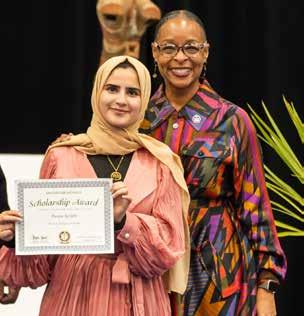
Ayoubi studied cognitive science at Mesa College and completed the Medical Assistant Program and ahead of wrapping up a medical assistant externship at the Palm Care Cardiology Urgent Care Center in El Cajon. Originally from Afghanistan, she speaks five languages and volunteers extensively on campus and in the community.
“I am so proud of Husna and Mesa College for such remarkable excellence,” San Diego Mesa College President Ashanti T. Hands said. “This amazing opportunity will open numerous doors, paving the way for Husna to leave her brilliant imprint on the world, just as she was born to do.”
Ayoubi will transfer to Stanford in the fall.
Mesa College was one of 19 minority-serving educational institutions – alongside only two other community colleges – chosen to participate earlier this year in the 2024 U.S. Department of Agriculture’s Agricultural Export Market Challenge.
The Challenge was an immersive learning experience to simulate the work that Foreign Agricultural Service subject matter experts perform every day to increase export opportunities for U.S. food and agricultural products. The simulation helped students accrue knowledge
and skills across the disciplines of economics, diplomacy, scientific analysis, marketing, and trade policy.
During the five-week Challenge, geography professor Waverly Ray mentored four students – Carson Brumfield (Chemistry), Aidan Middleton (Business), Jenny Tong (Economics/Business Administration), and Victoria Velasquez (Business Administration) — in the development and presentation of a market entry strategy for a fictitious American company seeking sales opportunities for a U.S. food or agricultural product in an overseas market.
In the end, the Mesa College group earned an honorable mention for its final one-page report presentation. According to Mesa College President Ashanti T. Hands, “This opportunity allows us to see, serve, and support our students as they innovate ways to serve our community. This is equity and excellence in action!”


Student-athletes are common on most campuses, but a Miramar College trio recently took the “student” part of that equation to the next level. Women’s beach volleyball players Mia Fox, Zaria Henderson, and Natalie Repetti were enrolled in a total of 87 units this spring at three different colleges — all for the love of volleyball.
Repetti began attending Miramar in early 2024 to play beach volleyball for the Jets’ spring season. At the same time, she was finishing her senior year at UC San Diego, where for three years she had played on UC San Diego’s Division 1 women’s indoor volleyball team, the Tritons. When the Tritons’ season wrapped up last fall, Repetti wanted to continue competing and Miramar’s beach volleyball program seemed like the perfect fit.
“I was in the transfer portal for Division 1 volleyball and will play next season at (the University of Alabama in Tuscaloosa)," said Repetti. “I wanted to keep in shape.”
It’s relatively rare for college athletes to play two sports for two different institutions in the
same year, but Repetti had company. Her fellow UC San Diego teammate Zaria Henderson also played for the Tritons women’s volleyball team in the fall and the Jets beach volleyball team this spring. Henderson is currently in the transfer portal, hoping to find a four-year university where she can continue to play beach volleyball.
Because UC San Diego doesn’t field a beach volleyball program, Repetti and Henderson were eligible to play for a second school in the same year as long as they were enrolled as full-time students at both institutions. Maintaining full-time status means being enrolled in at least 12 units per school.
Juggling that kind of heavy workload is something their Miramar teammate Mia Fox knows well. Fox just completed her second year playing for the Jets while also taking a full class load at San Diego State University in pursuit of her bachelor’s degree in psychology.
How do they make it all work? Repetti took a total of 32 units in the spring (yes, you read that correctly), including 20 units at UC San Diego:

an upper division course in neurosciences, two education courses, a cognitive science elective course, and a theater class. She took her Miramar College classes online, including an economics class, a philosophy class, a fashion class and a volleyball class.
Repetti called the schedule “a little stressful, but nothing too crazy. The UC San Diego classes (were) harder, but because I was a senior I had learned great time management skills,” she said.
On a typical day, she would wake up at the crack of dawn and head to Miramar College for morning practice, followed by a weight-training program required by her soon-to-be new school in Alabama. After lunch, she would head to La Jolla for on-campus classes at UC San Diego and two nights a week she coached volleyball at WAVE Volleyball club.
Henderson was enrolled in 28 units between UC San Diego and Miramar. Like Repetti, she wrapped up her third season playing for the Tritons in the fall. She said her experience competing for the Jets stretched her in new ways. “I am new to beach volleyball. Playing here (helped) me get in the work I need to get better,” Henderson said.
When asked how she managed the grind of 28 units and playing, she quipped, “You get used to it.” But she said she would often look at Repetti during practice and ask, “How did we end up here?”
Fox was enrolled in 27 units this spring between SDSU (15) and Miramar College (12). She said to ease the burden, she took a full load of eight-week courses at Miramar College that began in January and ended in late March.
“It’s tough at first, and asynchronized learning isn’t for everyone, but I find a way to get it done,” said Fox, who also works as a volleyball coach at nearby Westview High School. She plans to graduate in the fall from SDSU.
Not only are these student-athletes achieving their academic goals, their hard work is paying off on the court, too.
In April, Repetti and her teammate Jaalyn Sotoa won the Pacific Coast Athletic Conference’s women’s pairs championship. In addition, Repetti, Henderson and Fox all qualified for the CCCAA SoCal Regionals Championships, held May 3-4 at El Camino College in Torrance. Henderson and Fox advanced to the state tournament.


Students at San Diego College of Continuing Education are focused on creating solutions for fast fashion by designing with eco-friendly materials. Through a tuition-free Clothing and Textile Arts (CLTX) program, entrepreneur students will soon have access to the latest fiber technology to leave an even greener footprint.
While the college already offers cut-and-sew textile industry Career Technical Education (CTE) certificate programs, the skills gained through the upcoming Automation. Innovation. Robotics. (A.I.R.) Skills Technical Trades and Workforce Development Center will prepare graduates as more competitive candidates for employment.
The college’s A.I.R. initiatives will encompass advanced automation, skilled trades, and consumer sciences to address disparities in these industries incorporating Industry 4.0 and 5.0 level certifications. Phase one of A.I.R. will bring robotic welders to the Educational Cultural Complex and a new CLTX Fiber Technology Lab at West City Campus.
Beginning in fall 2024, the College of Continuing Education will introduce new programming: Sewn Product Construction Essentials, Advanced Sewing Construction, Industrial Sewing and Manufacturing, Pattern Fitting Technician, Pattern Making For Product Development, Digital Printing, Embroidery and Digitizing, and the Essential Digital Tools for Manufacturing. The new certificates build on the College of Continuing Education’s clothing construction curriculum, which has been offered since 1980.
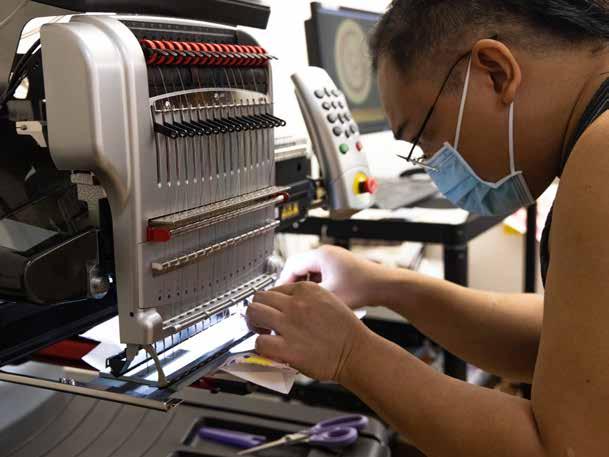
The idea to create A.I.R. has been in motion for nearly a decade. In 2017, professor Shirley Pierson began modernizing the CLTX curriculum, which had not been touched since the 1980s and had little to no inclusion of digital programming.
“A CLTX digitally and automated skilled technician will be able to produce textile products in multiple ways,” said Pierson. “Our students are making amazing things but it became clear that our equipment isn't big enough to produce at a sustainable level. The opportunity to introduce advanced technology and to further contribute to the creative
economy is exciting.
The fiber technology lab will house industrial sized machines to print, cure, and cut synthetic and natural fabrics, permitting entrepreneurial students to produce full scale goods without wasting product.
The integration of digital machinery is a real advantage for CLTX students like Ainara Calahorra, who took part in the Big Make Capstone “Make it Last” event in May. The capstone — centered on zero waste — invited students to design denim squares to weave into one large tapestry, representing the school’s diverse body and contribution to improv-
ing global carbon emissions. In addition to co-constructing the tapestry, Calahorra showcased her sustainable brand, MuXu Creations, which she launched through the former Sewn Products Business program. While learning to sew, Calahorra interned with Chicana fashion designer and industry advisory committee member, Claudia Rodríguez-Biezunski. “I learned much more than sustainability. I picked up valuable marketing techniques; how to talk about my brand, and how to tell my story,” said Calahorra, who is eager to utilize the new technology.
Growing up in a military family, Nathan Torres developed an early interest in aircraft and aviation. Now he’s studying welding at San Diego College of Continuing Education, hoping to pursue a career in the aerospace industry.

At the college’s Educational Cultural Complex, Torres, 31, is learning gas tungsten arc welding, an essential skill in several aerospace careers. Being on campus is nostalgic for the San Diego native; 10 years ago, he completed SDCCE’s accelerated high school program, graduating three months ahead of his peers.
After earning his diploma, Torres studied aerospace engineering at City College and was on track to transfer to UC San Diego, but his plan was interrupted by personal and financial challenges. With two jobs, he needed a program that allowed him to work at his own pace.
He was inspired to learn welding and reignite his aerospace dream by his 5-year-old son, Matthias. “My hope is to have (a) career that makes more than enough to provide for us and gives us more time together,” said Torres.
The welding program at the College of Continuing Education has also given Torres a chance to be part of southeast San Diego history. Under the direction of welding professor Mike Bradbury, Torres and his peers are helping to replicate The Black Family statue, created in 1974 by the late artist-in-residence Rossie Wade to represent the strength and pride of the local Black community.

The statue, which had deteriorated due to weather and vandalism, is a testament to Wade’s legacy and the rich civil rights history of the Educational Cultural Complex.
WE recently spoke with Torres about welding, art, aerospace and his plans for the future:
QWhy do you want to work in aerospace?
AMy dad served in the Navy, and being with (him) at his duty station in North Island, I was able to see how Navy helicopters were used and how they were put together. It was so cool. That exposure sparked my curiosity with aviation and space.
QWhy are you so passionate about welding?
A
I love welding because it is a whole sensory process. It is the feeling you get from the electricity, from the rod to the metal. You can smell it, hear it, and notice the differences in arches. Welding is my niche, from fabricating the metal to the whole artistry of the craft.
QWhat was it like to contribute to the making of the Black Family statue?
AWhat the Black Family statue represents is amazing. It is something I made with my own hands. If my son goes to this school, he will be able to see it. It still astonishes me that when I signed up for this class that this would be the by-product. Helping to sculpt this statue was something I really committed myself to.
QWhat inspires you about metal art?
A
Welding gives me a new perspective to see the world around me. There is so much creativity to it. Outside of aerospace, I would love to be a metal artist and own a father-and-son business. That is the beauty of welding, it opens so many doors.






3375 Camino del Rio South San Diego, CA 92108-3883
sdccd.edu Follow us on Facebook, YouTube, and Instagram!

facebook.com/sdccd youtube.com/TheSDCCD instagram.com/thesdccd
